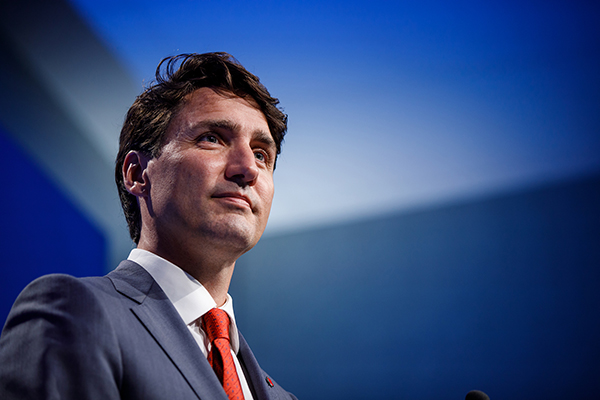A wide-ranging interview with Canadian Prime Minister Justin Trudeau

F&D: As you survey the international community’s efforts to tackle climate change, what are we doing right, and where are we falling short?
PM Trudeau: I am encouraged by work around the world to meet the Paris Climate Agreement goals. More and more countries are implementing a price on pollution, for example. Meanwhile, at universities and research centers around the world, some of our sharpest minds are coming up with technologies that will usher us toward a carbon-neutral future.
But more work needs to be done. Some of our closest allies and partners have wavered from commitments made at COP21 [2015 UN climate change conference]. In Canada, we have seen resistance to our federal carbon pollution pricing system. We simply cannot delay action any longer. The livelihoods and futures of Canadians and other people around the world depend on leaders of every country taking bold, concerted action today.
That’s why Canada hosted this year’s Clean Energy Ministerial. We welcomed climate leaders from over 25 countries, and what we accomplished confirms what Canadians already know: when dealing with a global problem like climate change, international cooperation and solutions are paramount. The ministerial delivered new investments in carbon capture technology and electric vehicle production while underscoring that, for many countries, the momentum to fight climate change has never been stronger.
F&D: The Bank of Canada recently released its 2019 Financial System Review and, for the first time, listed climate change as one of six major vulnerabilities facing Canada’s economy. What would a financial system that accounts for climate risk look like, and why would that matter?
PM Trudeau: Despite the progress we are making in the fight against climate change, its effects are mounting and being increasingly felt by more and more people, especially the most vulnerable, around the world. Canada’s economy is strong and growing, but its future success depends on a bold, concerted response to climate change.
Canadian businesses need the proper tools and resources to thrive as we transition to a greener future. Building our financial sector around sustainability is therefore a must. By combining the expertise of the financial sector with environmental considerations, our banks can help us build a carbon-neutral economy. That’s why in 2018, Canada’s minister of finance and minister of environment and climate change created the Expert Panel on Sustainable Finance. In June, we received the final report from the Expert Panel and are currently considering its findings.
If we are to meet our Paris Agreement commitments, future economic growth needs to be sustainable. With a strong economy, a solid track record of innovation, and an internationally competitive financial sector, Canada has an opportunity to become a world leader in sustainable finance. By playing to all of these strengths, we can face the challenge of climate change head-on while making sure Canadians benefit from a strong and sustainable economy for generations to come.
F&D: Switching gears to international affairs, one of the most important challenges we face today is cyberattacks, whether on financial institutions, critical infrastructure, or other elements integral to our way of life. How would you rank the cyber threat to Canadians, and how are you tackling these issues?
PM Trudeau: We know the costs of cybercrime. In Canada, data breaches cost our citizens and businesses over $3 billion each year. To tackle cyberattacks and lead the way in the global cyber challenge, we made the single largest investment in cybersecurity ever made by the Canadian government. To that end, we launched the Canadian Centre for Cyber Security, which brings together all federal operational cyber expertise under one roof. For the first time, we have a single, trusted source of expert advice and services for government, critical infrastructure operators, the private sector, and the Canadian public. Additionally, we introduced a National Cyber Security Strategy to enhance cybersecurity in Canada, protect critical infrastructure, and help Canadians stay safe online. We also recently invested $200 million in our national police force to ensure they have the necessary tools and resources to fight online crime.
Cybersecurity is as much a challenge as it is an opportunity. Innovations in online security services account for $1.7 billion of Canada’s GDP per year. Meanwhile, cybersecurity supports 20,000 jobs across the country, with the potential to create hundreds of thousands more around the world. Through collaboration with private sector partners, we will continue to create a stronger environment for security research and innovation in Canada.
F&D: Building on this theme, social media platforms have enabled the spread of misinformation to a degree never before seen in history. How are you approaching this particular challenge in Canada?
PM Trudeau: Canadians know all too well the real—and often tragic—consequences of online misinformation. The person who committed the despicable act of terror at the Quebec City Islamic Cultural Centre in 2017 was radicalized by online hate. Since then, we have seen attacks around the world inspired by similar hatred and misinformation, all accessed, fanned, and flamed through the internet.
World leaders have a responsibility to prevent the internet from being used as a tool for terrorism. That is why Canada has joined initiatives like New Zealand’s Prime Minister Ardern’s Christchurch Call to Action and is working with allies and platforms through the Global Internet Forum to Counter Terrorism to identify and take down terrorist content online.
To better protect our democracy from online misinformation, we recently passed a bill that will modernize Canada’s elections for the digital age and will guard against interference during an election period. We are also collaborating with social media platforms to maintain a registry of partisan and election advertising published during the lead-up to, and during, our elections. These actions will keep social media transparent and make sure Canadians have a better sense of where their information is coming from.
Reducing disinformation online is essential to making our electoral systems stronger. In a global ecosystem like the internet, regulations cannot be piecemeal—completely eliminating the threat of online misinformation demands that countries work toward similar standards. We have taken first steps in Canada, and it is my hope that other countries will follow suit.
F&D: Earlier this year Canada hosted the Women Deliver conference to accelerate progress toward creating a more equal world. Indeed, our March issue focused on women and growth. What are some of your signature policies and actions to date that exemplify your commitment to gender equality?
PM Trudeau: In 2015, we made gender equality a core commitment of our campaign—a first in Canadian history. Delivering on that commitment has been one of our top priorities as a government, starting with our appointment of Canada’s first-ever gender balanced cabinet.
Since then, we have made significant investments and passed landmark legislation to build a more equal and inclusive country. We created the first-ever National Strategy to Prevent and Address Gender-Based Violence. We passed legislation to ensure equal pay for work of equal value in the federal public service and to eliminate harassment and violence in the federal workplace. Gender-based analysis now also factors into all of our major policy decisions, including the federal budget.
At home, we launched the Women’s Entrepreneurship Strategy and invested $2 billion to support women entrepreneurs, which will help double the amount of women-owned businesses in Canada by 2025. Recognizing that grassroots organizations often best serve and understand the needs of their communities, we also invested $100 million in women’s organizations across Canada.
F&D: How does your commitment to gender equality manifest in Canada’s efforts abroad?
PM Trudeau: Beyond our borders, we launched the Feminist International Assistance Policy, which makes gender equality and women’s empowerment a focus of all our international assistance. The policy recognizes that gender equality and the empowerment of women and girls are the best way to build a more inclusive and prosperous world. We also established the Equality Fund—by bringing together resources from the private sector, civil society, and government—to alleviate financial constraints facing women’s organizations around the world. Most recently, at the Women Deliver conference in Vancouver, Canada committed $1.4 billion annually to support women and girls’ health around the world, with $700 million of the annual investment dedicated to sexual and reproductive health rights.
As a champion for gender equality, our government has also galvanized support from partners. During Canada’s G7 presidency in 2018, we created the Gender Equality Advisory Council to bring a gender equality lens across all G7 activities. Thanks to the Council’s leadership, at the G7 Summit in Charlevoix, Canada and partners announced an investment of almost $4 billion in education for women and girls in conflict and crisis situations—the largest investment of its kind ever made.
Opinions expressed in articles and other materials are those of the authors; they do not necessarily reflect IMF policy.
IMF Related Links:
- Back to Basics: What Is Carbon Taxation? by Ian Parry (June 2019)
- Getting Real on Meeting Paris Climate Change Commitments by Christine Lagarde and Vitor Gaspar (May 2019)
- Closing the Gender Gap by Era Dabla-Norris and Kalpana Kochhar (March 2019)








